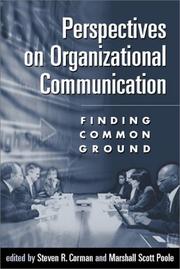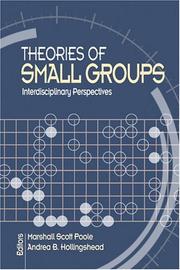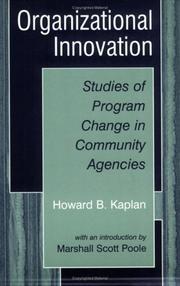| Listing 1 - 10 of 24 | << page >> |
Sort by
|
Book
ISBN: 3319489410 3319489402 Year: 2017 Publisher: Cham : Springer International Publishing : Imprint: Springer,
Abstract | Keywords | Export | Availability | Bookmark
 Loading...
Loading...Choose an application
- Reference Manager
- EndNote
- RefWorks (Direct export to RefWorks)
This volume introduces a series of different data-driven computational methods for analyzing group processes through didactic and tutorial-based examples. Group processes are of central importance to many sectors of society, including government, the military, health care, and corporations. Computational methods are better suited to handle (potentially huge) group process data than traditional methodologies because of their more flexible assumptions and capability to handle real-time trace data. Indeed, the use of methods under the name of computational social science have exploded over the years. However, attention has been focused on original research rather than pedagogy, leaving those interested in obtaining computational skills lacking a much needed resource. Although the methods here can be applied to wider areas of social science, they are specifically tailored to group process research. A number of data-driven methods adapted to group process research are demonstrated in this current volume. These include text mining, relational event modeling, social simulation, machine learning, social sequence analysis, and response surface analysis. In order to take advantage of these new opportunities, this book provides clear examples (e.g., providing code) of group processes in various contexts, setting guidelines and best practices for future work to build upon. This volume will be of great benefit to those willing to learn computational methods. These include academics like graduate students and faculty, multidisciplinary professionals and researchers working on organization and management science, and consultants for various types of organizations and groups.
Social sciences --- Statistical methods --- Data processing. --- Computer science. --- Knowledge management. --- Big data. --- Data mining. --- Computer simulation. --- Social sciences. --- Computer Science. --- Simulation and Modeling. --- Methodology of the Social Sciences. --- Big Data/Analytics. --- Data Mining and Knowledge Discovery. --- Industrial and Organizational Psychology. --- Knowledge Management. --- Applied psychology. --- Methodology. --- Management of knowledge assets --- Management --- Information technology --- Intellectual capital --- Organizational learning --- Applied psychology --- Psychagogy --- Psychology, Practical --- Social psychotechnics --- Psychology --- Algorithmic knowledge discovery --- Factual data analysis --- KDD (Information retrieval) --- Knowledge discovery in data --- Knowledge discovery in databases --- Mining, Data --- Database searching --- Data sets, Large --- Large data sets --- Data sets --- Computer modeling --- Computer models --- Modeling, Computer --- Models, Computer --- Simulation, Computer --- Electromechanical analogies --- Mathematical models --- Simulation methods --- Model-integrated computing --- Industrial psychology. --- Business psychology --- Industrial psychology --- Psychotechnics --- Industrial engineering --- Personnel management --- Psychology, Applied --- Industrial psychologists --- Behavioral sciences --- Human sciences --- Sciences, Social --- Social science --- Social studies --- Civilization
Digital
ISBN: 9783319489414 Year: 2017 Publisher: Cham Springer International Publishing
Abstract | Keywords | Export | Availability | Bookmark
 Loading...
Loading...Choose an application
- Reference Manager
- EndNote
- RefWorks (Direct export to RefWorks)
This volume introduces a series of different data-driven computational methods for analyzing group processes through didactic and tutorial-based examples. Group processes are of central importance to many sectors of society, including government, the military, health care, and corporations. Computational methods are better suited to handle (potentially huge) group process data than traditional methodologies because of their more flexible assumptions and capability to handle real-time trace data. Indeed, the use of methods under the name of computational social science have exploded over the years. However, attention has been focused on original research rather than pedagogy, leaving those interested in obtaining computational skills lacking a much needed resource. Although the methods here can be applied to wider areas of social science, they are specifically tailored to group process research. A number of data-driven methods adapted to group process research are demonstrated in this current volume. These include text mining, relational event modeling, social simulation, machine learning, social sequence analysis, and response surface analysis. In order to take advantage of these new opportunities, this book provides clear examples (e.g., providing code) of group processes in various contexts, setting guidelines and best practices for future work to build upon. This volume will be of great benefit to those willing to learn computational methods. These include academics like graduate students and faculty, multidisciplinary professionals and researchers working on organization and management science, and consultants for various types of organizations and groups.
Psychology --- Theory of knowledge --- Social sciences (general) --- Industrial psychology --- Information systems --- Artificial intelligence. Robotics. Simulation. Graphics --- kennismanagement --- toegepaste psychologie --- datamining --- machine learning --- time series analysis --- vormgeving --- sociale wetenschappen --- mineralen (chemie) --- simulaties --- mijnbouw --- organisatiepsychologie --- gegevensanalyse --- KI (kunstmatige intelligentie) --- methodologieën --- data acquisition --- AI (artificiële intelligentie)
Book
Year: 1997 Publisher: Thousand Oaks (Calif.): Sage
Abstract | Keywords | Export | Availability | Bookmark
 Loading...
Loading...Choose an application
- Reference Manager
- EndNote
- RefWorks (Direct export to RefWorks)

ISBN: 076190462X 0761904611 1322415366 145224376X 1506320511 1452248699 9781452248691 9781506320519 9781452243764 9780761904618 Year: 1996 Publisher: Thousand Oaks, Calif. Sage
Abstract | Keywords | Export | Availability | Bookmark
 Loading...
Loading...Choose an application
- Reference Manager
- EndNote
- RefWorks (Direct export to RefWorks)
Communication and Group Decision-Making takes stock of recent group communication research - with an explicit focus on communication processes. This book is recommended for academics professionals and researchers in communication and organization.
Primary groups --- Organization theory --- Mass communications --- Communication in management --- Group decision making --- Communication en gestion --- Décision de groupe --- 65.012.4 --- #SBIB:309H021 --- #SBIB:309H250 --- #SBIB:AANKOOP --- Management. Directorate. Technique and methods of management --- Intra- en interpersonele communicatie --- Interne en externe communicatie: algemene werken --- Group decision-making. --- Communication in management. --- 65.012.4 Management. Directorate. Technique and methods of management --- Décision de groupe --- Group decision-making --- Collective decision making --- Decision-making, Group --- Decision making --- Communication in industry --- Managerial communication --- Management --- E-books --- Group decision making.

ISBN: 1572306025 Year: 2000 Publisher: New York Guilford Press
Abstract | Keywords | Export | Availability | Bookmark
 Loading...
Loading...Choose an application
- Reference Manager
- EndNote
- RefWorks (Direct export to RefWorks)
Organization theory --- Mass communications --- Communication in organizations. --- Telecommunication. --- Communication. --- Communication dans les organisations --- Télécommunications --- Communication --- Communication in organizations --- Telecommunication --- #SBIB:309H250 --- #SBIB:013.AANKOOP --- Communication, Primitive --- Mass communication --- Sociology --- Electric communication --- Telecom --- Telecommunication industry --- Telecommunications --- Information theory --- Telecommuting --- Organizational communication --- Organization --- Interne en externe communicatie: algemene werken --- Télécommunications

ISBN: 1483328937 145224538X 9781452245386 0761930752 9780761930754 0761930760 9780761930761 1322420645 150631984X 9781506319841 9781483328935 Year: 2005 Publisher: Thousand Oaks, Calif. Sage
Abstract | Keywords | Export | Availability | Bookmark
 Loading...
Loading...Choose an application
- Reference Manager
- EndNote
- RefWorks (Direct export to RefWorks)
People live in groups, work in groups and play in groups, so it is therefore logical that groups are subject to study across the social and behavioral sciences. This text summarises the current state of group theory and research, looking at major advances made in the field during the last 50 years.
Small groups. --- Sociology. --- Social theory --- Social sciences --- Groups, Small --- Social groups

ISBN: 0673158365 9780673158369 Year: 1984 Publisher: Glenview, Ill.: Scott, Foresman,
Abstract | Keywords | Export | Availability | Bookmark
 Loading...
Loading...Choose an application
- Reference Manager
- EndNote
- RefWorks (Direct export to RefWorks)
Social conflict --- Conflict (Psychology) --- Conflict management --- Social interaction --- Interpersonal communication

ISBN: 0306478528 Year: 2003 Publisher: New York (N.Y.) Kluwer Academic/Plenum
Abstract | Keywords | Export | Availability | Bookmark
 Loading...
Loading...Choose an application
- Reference Manager
- EndNote
- RefWorks (Direct export to RefWorks)
Book
ISBN: 9780415806329 9780415806336 9780203805770 Year: 2012 Publisher: New York, NY Routledge
Abstract | Keywords | Export | Availability | Bookmark
 Loading...
Loading...Choose an application
- Reference Manager
- EndNote
- RefWorks (Direct export to RefWorks)
Small groups --- Research --- Methodology --- Study and teaching --- Research&delete&
Book
ISBN: 1136650431 113665044X 0203805771 Year: 2012 Publisher: New York : Routledge,
Abstract | Keywords | Export | Availability | Bookmark
 Loading...
Loading...Choose an application
- Reference Manager
- EndNote
- RefWorks (Direct export to RefWorks)
This volume provides an overview of the methodological issues and challenges inherent in the study of small groups from the perspective of seasoned researchers in communication, psychology and other fields in the behavioral and social sciences. It summarizes the current state of group methods in a format that is readable, insightful, and useful for both new and experienced group researchers. This collection of essays will inspire new and established researchers alike to look beyond their current methodological approaches, covering both traditional and new methods for studying groups and exploring the full range of groups in face-to-face and online settings. The volume will be an important addition to graduate study on group research and will be a valuable reference for established group researchers, consultants and other practitioners. The essays in this volume when considered as a whole will be a contemporary interdisciplinary integration on group research methods.
Small groups --- Research --- Methodology. --- Study and teaching.
| Listing 1 - 10 of 24 | << page >> |
Sort by
|

 Search
Search Feedback
Feedback About UniCat
About UniCat  Help
Help News
News